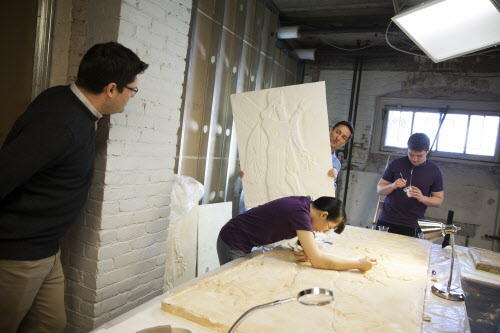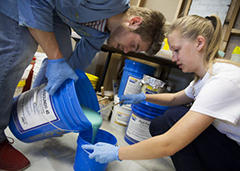A ‘tangible dimension’: Learning by making, listening, and tasting
This post is republished from Into Practice, a biweekly communication of Harvard’s Office of the Vice Provost for Advances in Learning.
Gojko Barjamovic, Lecturer on Assyriology, increases student learning in ANE 103 Ancient Lives by designing activities to engage students’ full range of senses. “To convince people to commit a semester of study to ancient history, you have to make it meaningful.”

The benefits: Barjamovic accomplishes this with experiences like making plaster casts of ancient Mesopotamian reliefs in collaboration with the Semitic Museum, playing replicas of the world’s oldest instruments, conducting lab experiments testing the efficacy of ancient medical recipes, brewing beer, and cooking 4,000-year-old Babylonian recipes. “Some students thrive with lectures, but others don’t, especially in something as initially abstract as history. First-hand experiences address the basic human condition over thousands of years and provide a tangible dimension to it.”
The challenges: Organizing a course around once-in-a-lifetime activities does not necessarily adhere to a traditional semester schedule; students produce only one project and a take home exam, but can expect to spend 25 hours outside of class on related activities. Barjamovic shares this expectation early and works closely with teaching fellows and collaborators to ensure that students stay on track within this structure.
Takeaways and best practices:
- The benefits extend beyond student learning. Working on the reliefs, students not only learn by doing, but also offer Harvard extra hands to produce exhibits used in the remodeled Semitic Museum.
- Flexible assignments make for meaningful connections. For the main assignment, students often select topics relevant to their personal interests, integrating the liberal arts experience: “Having the courage to allow them do their own thing and lose control for a while is hard, but they are very creative and their projects mostly come together organically.”
 Be open to serendipitous curricular opportunities. Barjamovic developed Ancient Lives with support from the Office of General Education, and financial aid from the Elson Family Arts Initiative and the Office of the Provost. Opportunities like the music and cooking classes came to fruition as a result of shared interest conversations and collaborations with colleagues. This year’s Ancient Lives students are producing a theatrical production of the Epic of Gilgamesh in collaboration with the A.R.T. and the Semitic Museum, integrating museum casts, music, and costume. “There are so many opportunities on this campus, you can’t avoid running into some of them.”
Be open to serendipitous curricular opportunities. Barjamovic developed Ancient Lives with support from the Office of General Education, and financial aid from the Elson Family Arts Initiative and the Office of the Provost. Opportunities like the music and cooking classes came to fruition as a result of shared interest conversations and collaborations with colleagues. This year’s Ancient Lives students are producing a theatrical production of the Epic of Gilgamesh in collaboration with the A.R.T. and the Semitic Museum, integrating museum casts, music, and costume. “There are so many opportunities on this campus, you can’t avoid running into some of them.”
Bottom line: Tangible activities promote focus and imagination, according to Barjamovic: “The key is to cater to individual interests—to create a personal window for learning.”

